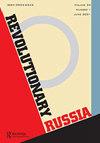A Revolutionary Locality in a Revolutionary State: The Changing Geography of Power in Central Siberia, March-October 1917
IF 0.2
2区 历史学
Q2 HISTORY
引用次数: 0
Abstract
This article examines the attempts of revolutionaries in the central Siberian city of Krasnoiarsk to transform the ‘geography of power’ by extending local autonomy within the context of the wider revolutionary state. It examines their efforts to do so through local challenges to the central appointment of a regional commissar (gubernskii komissar), the re-election of the municipal Duma, and the establishment of unions of local soviets across Eniseisk province and Siberia more generally. Considering these three cases, it challenges the idea that demands for local autonomy in Siberia were primarily pressed during this time by self-professed regionalists (oblastniki) whilst being shunned by socialists. Instead, it demonstrates that groups from across the political spectrum – foremost amongst them local socialists – adopted and developed their own agendas for local autonomy. It further contends that the idea of local autonomy did not express local actors’ desire to break away from the wider all-Russian state, but rather to reposition themselves within it, in the process refashioning the ‘geography of power’ on a more egalitarian basis. The article provides a contribution to understandings of Siberia in revolution, and to the role and self-conceptualisation of local actors in reconstructing state power.革命国家的革命地域:西伯利亚中部不断变化的权力地理,1917年3月至10月
本文考察了西伯利亚中部城市克拉斯诺亚尔斯克(Krasnoiarsk)的革命者在更广泛的革命国家背景下通过扩大地方自治来改变“权力地理”的尝试。它考察了他们通过地方挑战中央任命的地区政委(gubernskii komissar),重新选举市杜马,以及在埃尼泽斯克省和西伯利亚更广泛地建立地方苏维埃工会来实现这一目标的努力。考虑到这三个案例,它挑战了西伯利亚地方自治的要求主要是由自称的地方主义者(oblastniki)提出的,同时被社会主义者所回避。相反,它表明,来自各个政治派别的团体——其中最重要的是地方社会主义者——采用并制定了自己的地方自治议程。它进一步认为,地方自治的概念并没有表达地方行动者脱离更广泛的全俄罗斯国家的愿望,而是在更平等的基础上重塑“权力地理”的过程中,在其中重新定位自己。本文有助于理解革命中的西伯利亚,以及地方行动者在重建国家权力中的作用和自我概念化。
本文章由计算机程序翻译,如有差异,请以英文原文为准。
求助全文
约1分钟内获得全文
求助全文

 求助内容:
求助内容: 应助结果提醒方式:
应助结果提醒方式:


